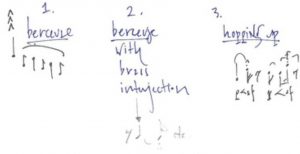Nico Muhly in the London Review of Books:
 I avoid reading accounts of other composers’ ways of working. I’ve only ever been disappointed by stories of their abusive and antagonistic relationships with the people they’re close to, or, in the case of historical figures, wild speculation about their mental states or marital problems or excessive drinking. When I talk to my colleagues, I am of course happy to hear about their sex dramas and squabbles with the landlord, but what I really want is shop talk: what kinds of pencil are you using? How are you finding this particular piece of software? Do you watch the news while you work? I find these details telling.
I avoid reading accounts of other composers’ ways of working. I’ve only ever been disappointed by stories of their abusive and antagonistic relationships with the people they’re close to, or, in the case of historical figures, wild speculation about their mental states or marital problems or excessive drinking. When I talk to my colleagues, I am of course happy to hear about their sex dramas and squabbles with the landlord, but what I really want is shop talk: what kinds of pencil are you using? How are you finding this particular piece of software? Do you watch the news while you work? I find these details telling.
For me, every project has three clearly defined phases: the scheming and planning; the writing of actual notes; the editing. The planning process almost entirely excludes, by design, notes and rhythms. When I was a twenty-year-old student at Juilliard, I constantly had hundreds of tiny, brilliant ideas, each lasting about five seconds, and instead of learning to use them, I’d just throw them at the wall in some order and the result would be a sparkling and disorganised mess, a free-form string of disjointed but attractive thoughts. My teacher set out to fix this problem, and taught me a method of planning I still use to this day. With every piece, no matter its forces or length, the first thing I do is to map out its itinerary, from the simplest, bird’s-eye view to more detailed questions: what are the textures and lines that form the piece’s musical economy? Does it develop linearly, or vertically? Are there moments of dense saturation – the whole orchestra playing at once – and are those offset by moments of zoomed-in simplicity: a single flute, or a single viola pitted against the timpani, yards and yards away?
More here.
